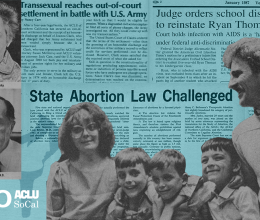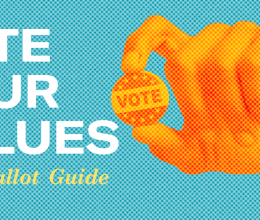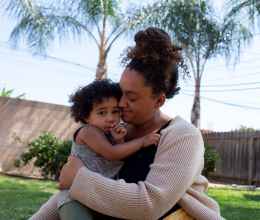
California made historic strides last summer with the passage of AB 1522, the Healthy Workplaces, Healthy Families Act of 2014, a law providing three paid sick days to workers across the state. Now, Los Angeles is preparing to double down on that landmark legislation with a new ordinance that, when enacted this summer, will allow workers to earn six paid sick days.
As part of the National Day of Action on Wednesday, May 18, the ACLU of Southern California joined with Clínica Romero; CA Work & Family Coalition; Los Angeles Alliance for a New Economy; Center for Law & Social Policy; Restaurant Opportunities Centers United; National Council of Jewish Women, Los Angeles; and Alliance of Californians for Community Empowerment in celebrating LA’s new law. The ACLU SoCal is pleased that Los Angeles is taking a leadership role in ensuring people in marginalized communities have the right to take better care of their families.
On the state level, AB 1522 was excellent news, particularly after LA subsequently passed an ordinance last year that will raise the minimum wage to $15 an hour by 2020. Los Angeles has improved on AB 1522 in several ways, and we hope other cities and states considering Paid Sick Leave legislation will learn from it. For example, LA’s law mandates six paid sick days instead of three.
Further, the Los Angeles ordinance uses the same family definition standards as the federal government applies to its workers’ rights to paid sick leave, which are much more inclusive than the state standard. Under federal regulations and now the LA ordinance, family members eligible for the benefit include “any individual related by blood or affinity whose close association with the employee is the equivalent of a family relationship.” That inclusive policy will cover workers whose families do not fit into the outmoded family structure model, such as workers who do not have any biological or legal family in Los Angeles, and LGBTQ workers who tend to rely more often on “chosen family,” which one survey defined as “a group of people to whom you are emotionally close and consider ‘family’ even though you are not biologically or legally related.”
Suppose, for example, that a worker who moved to Los Angeles decades ago either has no living relatives or whose nearest family member is thousands of miles away. Many such individuals form close relationships with co-workers, neighbors or friends they can call on if they fall ill, but under most laws those “chosen family” members can’t take paid sick days to provide care. The Los Angeles ordinance solves that problem.
Los Angeles is leading the nation in having its paid sick days ordinance include the most progressive definition of family. Everyone has the right to care for their family. Any paid sick days ordinance that fails to include everyone turns that into a privilege. We cannot allow for a two-tiered system of that sort to develop in our nation.
The need for inclusive paid sick days legislation everywhere in the nation is clear. Nearly 43 million workers in the U.S. – about 38% of working people – do not get paid sick time. That number is even worse in communities of color. A report released last April by the Institute for Women’s Policy Research found that in 2013, nearly 60% of the Hispanic population surveyed lacked paid sick time in Los Angeles, where the Hispanic population is approaching 50%. Less than 25% of Los Angeles workers in the lowest income bracket, who earn less than $15,000 a year, received paid sick time; by comparison, 85% of workers in the highest income bracket, earning more than $65,000, get paid sick time.
AB 1522 was a small step in the right direction; the Los Angeles ordinance is an even greater stride. Now it’s time for the federal government to act. In February 2015, Rep. Rosa L. DeLauro (D-CT) introduced The Healthy Families Act (HFA), which would establish a nationwide standard for paid sick time. Since then, the House Subcommittee on Health, Employment, Labor, and Pensions has taken no action on it.
Congress must step up. Let’s turn privileged access to sick time into a right for all.
Diana González is paralegal at the ACLU of Southern California.







